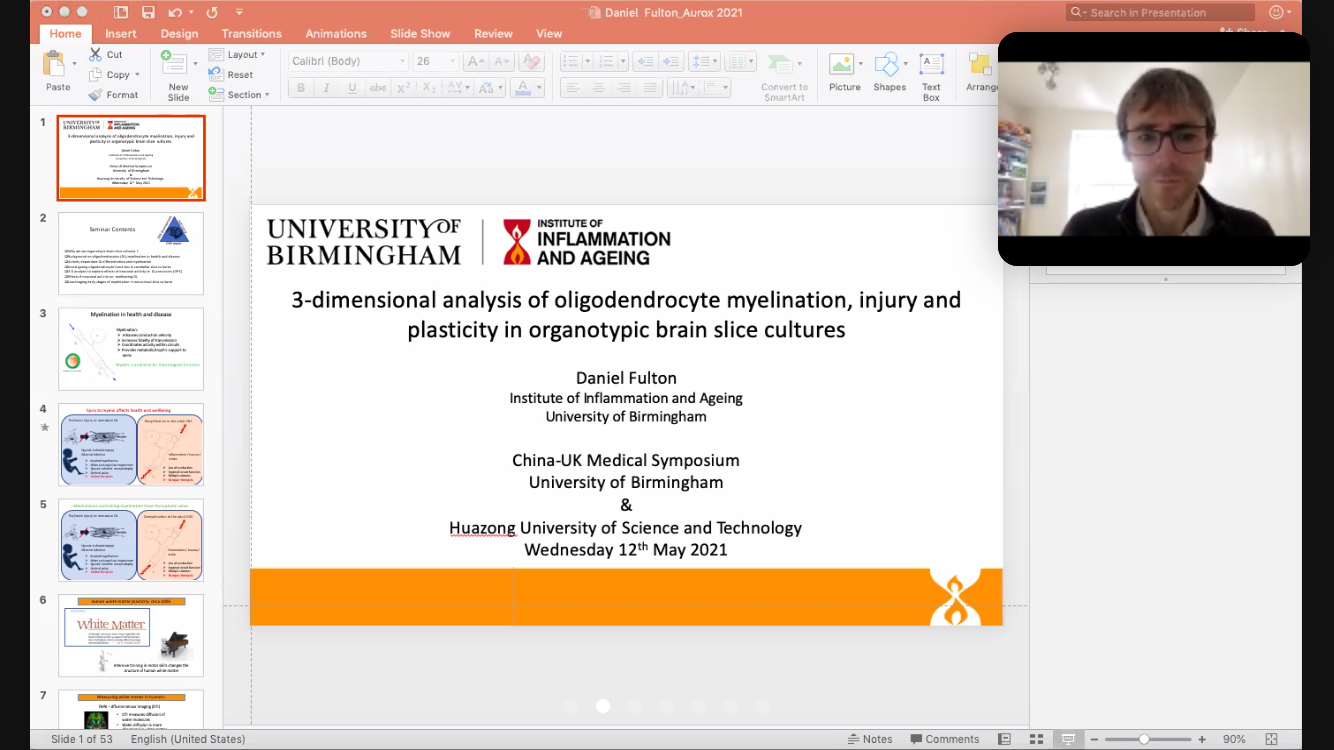On May 12, 2021, China-UK Medical Symposium was successfully held via ZOOM with the participation of faculty and students from both Huazhong University of Science and Technology and University of Birmingham.
Dr. Houze ZHU at School of Basic Medicine presided over the online symposium while Dr. Daniel Fulton and Dr. Lei PEI gave excellent lectures on behalf of their institutions respectively. Dr. Fulton is a lecturer in Glial Biology based in the Neuroscience, Trauma and Ophthalmology group of the Institute of Inflammation and Ageing. Dr. Pei, a faculty member of School of Basic Medicine, is working as a visiting scholar at Washington University in St. Louis under the support of HUST Overseas Training Program for Outstanding Young Teachers.

Daniel Fulton (left) from University of Birmingham School of Medicine and Lei PEI (right) from Huazhong University of Science and Technology School of Basic Medicine are delivering a speech to graduates via ZOOM.
Fulton gave a lecture on 3D analysis of oligodendrocytes myelination, injury and plasticity in organotypic brain slice culture. In vivo imaging in mouse neocortex has revealed the dynamic behavior of glial cells. Microglial processes constantly survey the local environment, while oligodendrocyte (OL) differentiate and myelinate axons in response to sensory stimuli. However, in vivo observations are limited to outer neocortical regions falling within the reach of 2-photon imaging, and information on glial behaviors in deep lying brain regions remain unknown. In his speech, Dr. Fulton described how his group used organotypic slice cultures to image OL behaviors in deeper lying regions including cerebellar white matter and deep neocortical grey and white matter. He presented his recent findings on activity-dependent myelination, and described a novel method they are using to live-image myelination in subcortical white matter.

Daniel Fulton is elaborating on his slides.
Dr. Pei gave a talk on his recent work on the central mechanism of ketamine general anesthesia after Dr. Fulton finished his impressive speech. Ketamine is the most unique anesthetic agent used today. With considerably diverse molecular targets and neurophysiological properties, ketamine's effects on the central nervous system in general anesthesia remain unknown. Dr. Pei introduced his recent study on the molecular and cellular mechanisms of ketamine general anesthesia. He used different approaches and demonstrated that the PKR2 neurons in anterior part of paraventricular nucleus (aPVT) modulates wakefulness from ketamine general anesthesia.

Dr. Pei is giving a lecture on the role of PVT PKR2 neurons in ketamine general anesthesia.
At the end of this online symposium, Dr. Fulton and Dr. Pei expressed their willingness to carry out practical cooperation in teaching and scientific research in the future.
China-UK Medical Symposium is a series of academic exchange activities initiated by Office of International Affairs of Huazhong University of Science and Technology as part of its efforts to promote international engagement during the epidemic.